Unit 10 You're supposed to shake hands Section B (2a-2e)课件(共22张PPT,内嵌音频))
文档属性
| 名称 | Unit 10 You're supposed to shake hands Section B (2a-2e)课件(共22张PPT,内嵌音频)) |  | |
| 格式 | pptx | ||
| 文件大小 | 9.4MB | ||
| 资源类型 | 教案 | ||
| 版本资源 | 人教新目标(Go for it)版 | ||
| 科目 | 英语 | ||
| 更新时间 | 2025-01-27 07:26:50 | ||
图片预览

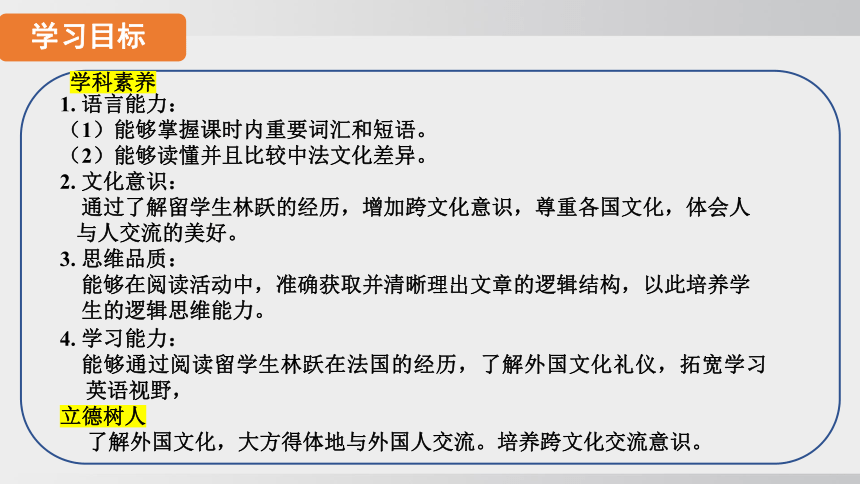
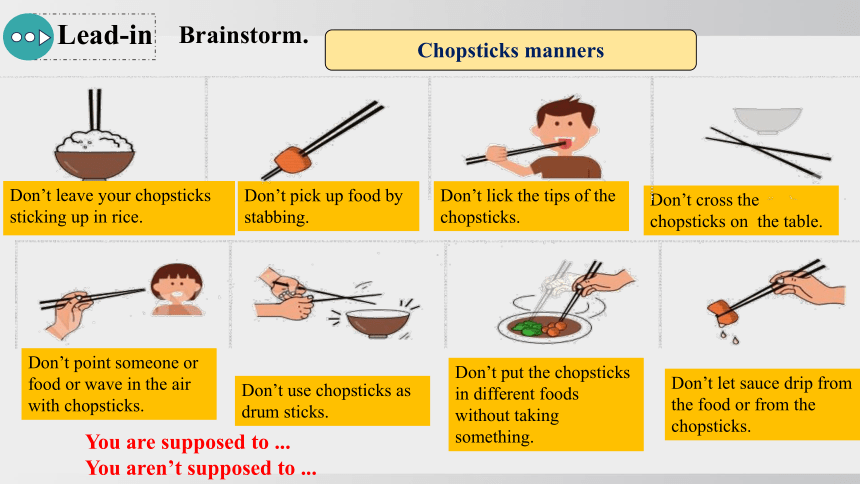
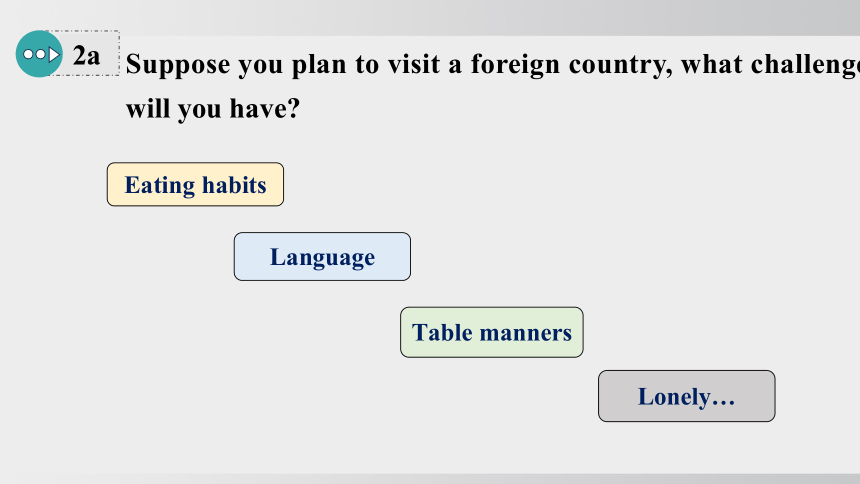
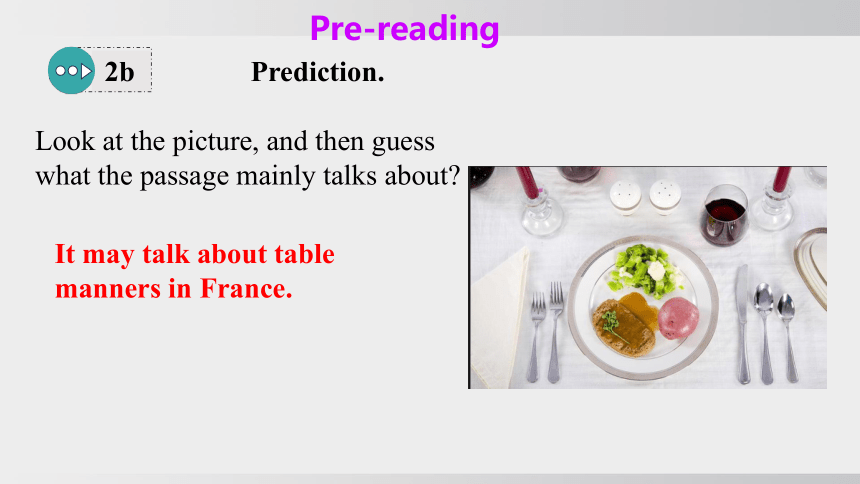
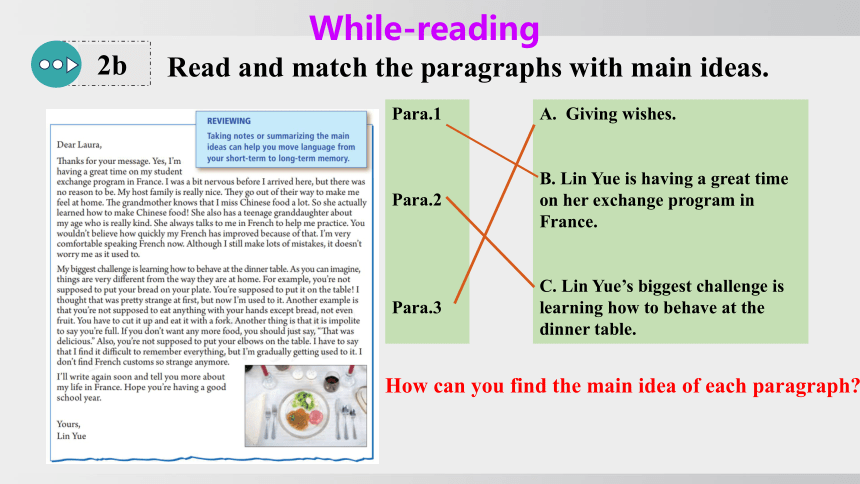


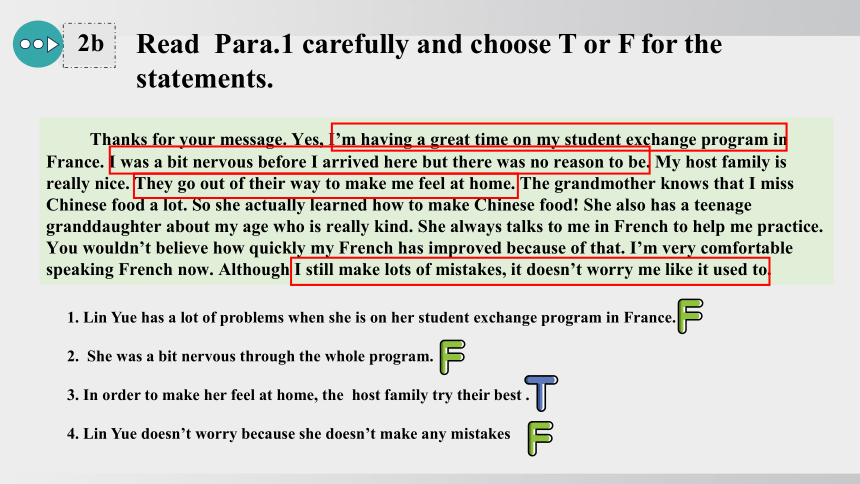
文档简介
(共22张PPT)
Section B (2a-2e)
UNIT 10 You’ re supposed to shake hands.
学科素养
1. 语言能力:
(1)能够掌握课时内重要词汇和短语。
(2)能够读懂并且比较中法文化差异。
2. 文化意识:
通过了解留学生林跃的经历,增加跨文化意识,尊重各国文化,体会人
与人交流的美好。
3. 思维品质:
能够在阅读活动中,准确获取并清晰理出文章的逻辑结构,以此培养学
生的逻辑思维能力。
4. 学习能力:
能够通过阅读留学生林跃在法国的经历,了解外国文化礼仪,拓宽学习英语视野,
立德树人
了解外国文化,大方得体地与外国人交流。培养跨文化交流意识。
Brainstorm.
Chopsticks manners
You are supposed to ...
You aren’t supposed to ...
Lead-in
Don’t pick up food by stabbing.
Don’t lick the tips of the chopsticks.
Don’t cross the chopsticks on the table.
Don’t let sauce drip from the food or from the chopsticks.
Don’t put the chopsticks in different foods without taking something.
Don’t use chopsticks as drum sticks.
Don’t point someone or food or wave in the air with chopsticks.
Don’t leave your chopsticks sticking up in rice.
Suppose you plan to visit a foreign country, what challenges will you have
Eating habits
Language
Table manners
Lonely…
2a
2b
Prediction.
Look at the picture, and then guess what the passage mainly talks about
It may talk about table manners in France.
Pre-reading
Read and match the paragraphs with main ideas.
2b
A. Giving wishes.
B. Lin Yue is having a great time on her exchange program in France.
C. Lin Yue’s biggest challenge is learning how to behave at the dinner table.
Para.1
Para.2
Para.3
How can you find the main idea of each paragraph
While-reading
Try to find the topic sentence of each paragraph
and fill in the blanks.
From the topic sentences , we can learn the letter is about __________________.
2b
Lin Yue’s life in France.
Read the passage and answer the questions.
She is on a student exchange program.
Yes, she does. This can be seen in the way she talks about her host family: that they are nice and they go out of their way to make her feel at home; that the grandmother makes Chinese food for her; that the granddaughter is kind and talks to her in France to help her practice.
It doesn’t worry her as it used to.
Learning how to behave at the dinner table.
1. Why is Lin Yue in France
2. Does she enjoy staying with her host family How do you know
3. How does she feel about making mistakes when she speaks French
4. What is the biggest challenge she is facing
2b
2b
Thanks for your message. Yes, I’m having a great time on my student exchange program in France. I was a bit nervous before I arrived here but there was no reason to be. My host family is really nice. They go out of their way to make me feel at home. The grandmother knows that I miss Chinese food a lot. So she actually learned how to make Chinese food! She also has a teenage granddaughter about my age who is really kind. She always talks to me in French to help me practice. You wouldn’t believe how quickly my French has improved because of that. I’m very comfortable speaking French now. Although I still make lots of mistakes, it doesn’t worry me like it used to.
1. Lin Yue has a lot of problems when she is on her student exchange program in France.
2. She was a bit nervous through the whole program.
3. In order to make her feel at home, the host family try their best .
4. Lin Yue doesn’t worry because she doesn’t make any mistakes
Read Para.1 carefully and choose T or F for the statements.
a little nervous
comfortable
go out of the way to make her feel at home
the host family
learns
helps
The grandmother
how to make Chinese food.
practice French by talking to her
a teenage granddaughter
1. _________________
3. ___________________________
2. _________________________
4. ____________________________________
Read the first paragraph again and complete the mind map.
2b
My biggest challenge is learning how to behave at the dinner table. As you can imagine, things are very different from the way they are at home. For example, you’re not supposed to put your bread on your plate. You’re supposed to put it on the table! I thought that was pretty strange at first, but now I’m used to it. Another example is that you’re not supposed to eat anything with your hands except bread, not even fruit. You have to cut it up and eat it with a fork. Another thing is that it’s impolite to say you’re full. If you don’t want any more food, you should just say, “That was delicious.” Also, you’re not supposed to put your elbows on the table. I have to say that I find it difficult to remember everything, but I’m gradually getting used to it. I don’t find French customs so strange anymore.
1. Why does Lin Yue think learning how to behave at the dinner table is her biggest challenge
2. Does Lin Yue think it difficult to remember everything
3. What does she think of customs in France now
Because things are very different from the way they are at home.
Yes, she does.
She doesn’t find customs so strange anymore.
Read Para. 2 carefully and answer the following questions.
2b
Read Para.2 and fill in the chart.
Table manners Supporting details
◆1. You’re not supposed to __________________________. You’re supposed to ____________________.
◆ 2. You’re not supposed to ___________________________.
◆ 3. It’s impolite to ____________________.
◆4. You’re not supposed to ______________
_________ .
put your bread on your plate
put it on the table
put your elbows on the tables
say you are full
eat anything with your hands
except bread
2b
Dear Laura,
Thanks for your message. Yes, I’m having a great time on my student exchange program in France. I was a bit nervous before I arrived here, but there was no reason to be. My host family is really nice.They go out of their way to make me feel at home. The grandmother knows that I miss Chinese food a lot. So she actually learned how to make Chinese food! She also has a teenage granddaughter about my age who is really kind. She always talks to me in French to help me practice. You wouldn’t believe how quickly my French has improved because of that. I’m very comfortable speaking French now. Although I still make lots of mistakes, it doesn’t worry me as it used to.
Thanks for 因……而感谢
exchange在此作名词,意为“交换”。常用短语:in exchange for“交换……”
no reason to do sth. 没有理由做……
go out of one’s way to do sth. 竭尽全力做某事
be comfortable doing 做某事很舒适
make mistakes犯错误
Careful reading
My biggest challenge is learning how to behave at the dinner table. As you can imagine, things are very different from the way they are at home. For example, you’re not supposed to put your bread on your plate. You’re supposed to put it on the table! I thought that was pretty strange at first, but now I’m used to it. Another example is that you’re not supposed to eat anything with your hands except bread, not even fruit. You have to cut it up and eat it with a fork. Another thing is that it is impolite to say you’re full. If you don’t want any more food, you should just say, “That was delicious.” Also, you’re not supposed to put your elbows on the table. I have to say that I find it difficult to remember everything, but I’m gradually getting used to it. I don’t find French customs so strange anymore.
I’ll write again soon and tell you more about my life in France. Hope you’re having a good school year.
Yours,
Lin Yue
behave v. 表现;举止
as you can imagine 正如你能想象的
be different from 与……不同
at first 起初
except prep. 除……之外 conj. 除了;只是
find it difficult to do it是形式宾语,后面的不定式短语to remember everything是真正的宾语。
cut up 切碎
not...anymore 不再
get used to... 习惯做某事be used to doing sth. 习惯于做某事
拓展:used to do sth. 过去常常做某事
be used to 被用来
Exercises
用所给单词的正确形式填空
1.It’s ________ (polite)to stick your chopsticks into your food.
2.Don’t forget _______ (change)your email address at the end of the party.
3.Can you tell me how ________ (behave) at the dinner table
4.________ (gradual), she realized that he wasn’t telling her the truth.
5.I’m getting used to ________ (use) chopsticks in China.
6.They go out of their way to make me ________ (feel) at home.
7.You aren’t ________ (expect) to talk while eating.
8.Thank you for _________ (invite) me to your birthday party.
9.Now, I _________ (have) a great time visiting France.
10.Last Sunday, Jim’s mother made him ________ (study) at home all day.
impolite
to change
to behave
Gradually
using
feel
expected
inviting
am having
study
1. Making mistakes in French used to make Lin Yue nervous. 2. It was quite hard for her to feel good about speaking French. 3. The host family tried very hard to help Lin Yue. 4. Lin Yue has slowly learned how to be like her French friends. ● went out of their way
● be comfortable (doing)
● gradually gotten used to being
● (something) worry (someone)
Read the sentences and replace the underlined words with the phrases in the box.
2c
Review the passage and make notes about French customs in the chart.
Dos Don’ts
You’re expected to put your bread on the table.
You’re not supposed to put your bread on your plate.
You’re expected to cut up your fruit and eat it with a fork.
You’re not supposed to eat anything
with your hands except bread.
You’re expected to say “That was delicious” if you don’t want any more food.
You’re not supposed to say
you’re full.
You’re not supposed to put
your elbows on the table.
2d
Compare the table manners in France and China in your group. How are they the same or different Make a list.
e.g. In France, people put their bread on the table. But in China, we always put our food on a plate or in a bowl. We never put food on the table.
Post-reading
2e
There are different customs about table manners between China and France. What are they
Student A is a foreign visitor who is interested in table manners. Student B is a Chinese student who knows about table manners. Use the information in the passage to make a conversation.
In China, you should ______. You aren’t supposed to ____
2e
How about France
In France, you are expected to ________.
You are supposed to ________. It’s impolite to _____________.
Student A is a foreign visitor who is interested in Abing and his music. Student B is a Chinese student who knows about Abing. Use the information in the passage to make a conversation.
2e
Differences Similarities
1. …
2. …
1. You’re expected to put your bread on the table. 2. … 1. … 2. … Make a list.
2e
What are
you
supposed
to do
basic, exchange, behave, teenage, granddaughter, elbow, gradually, except
go out of one’s way, no reason to be, be comfortable doing, make...feel at home..., get used to (doing) sth., not....any more
1. They go out of their way to make me feel at home.
2.You wouldn’t believe how quickly my French has improved because of that.
3. Although I still make lots of mistakes, it doesn’t worry me like it used to.
4. My biggest challenge is learning how to behave at the dinner table.
5.You’re not supposed to eat anything with your hands except bread,not even fruit.
6. I have to say that I find it difficult to remember everything, but I’m gradually getting used to it.
Reviewing
Taking notes or summarizing the main ideas can help you move language from your short-term to long-term memory.
Words
Phrases
Target language
Reading strategy
Summary
Section B (2a-2e)
UNIT 10 You’ re supposed to shake hands.
学科素养
1. 语言能力:
(1)能够掌握课时内重要词汇和短语。
(2)能够读懂并且比较中法文化差异。
2. 文化意识:
通过了解留学生林跃的经历,增加跨文化意识,尊重各国文化,体会人
与人交流的美好。
3. 思维品质:
能够在阅读活动中,准确获取并清晰理出文章的逻辑结构,以此培养学
生的逻辑思维能力。
4. 学习能力:
能够通过阅读留学生林跃在法国的经历,了解外国文化礼仪,拓宽学习英语视野,
立德树人
了解外国文化,大方得体地与外国人交流。培养跨文化交流意识。
Brainstorm.
Chopsticks manners
You are supposed to ...
You aren’t supposed to ...
Lead-in
Don’t pick up food by stabbing.
Don’t lick the tips of the chopsticks.
Don’t cross the chopsticks on the table.
Don’t let sauce drip from the food or from the chopsticks.
Don’t put the chopsticks in different foods without taking something.
Don’t use chopsticks as drum sticks.
Don’t point someone or food or wave in the air with chopsticks.
Don’t leave your chopsticks sticking up in rice.
Suppose you plan to visit a foreign country, what challenges will you have
Eating habits
Language
Table manners
Lonely…
2a
2b
Prediction.
Look at the picture, and then guess what the passage mainly talks about
It may talk about table manners in France.
Pre-reading
Read and match the paragraphs with main ideas.
2b
A. Giving wishes.
B. Lin Yue is having a great time on her exchange program in France.
C. Lin Yue’s biggest challenge is learning how to behave at the dinner table.
Para.1
Para.2
Para.3
How can you find the main idea of each paragraph
While-reading
Try to find the topic sentence of each paragraph
and fill in the blanks.
From the topic sentences , we can learn the letter is about __________________.
2b
Lin Yue’s life in France.
Read the passage and answer the questions.
She is on a student exchange program.
Yes, she does. This can be seen in the way she talks about her host family: that they are nice and they go out of their way to make her feel at home; that the grandmother makes Chinese food for her; that the granddaughter is kind and talks to her in France to help her practice.
It doesn’t worry her as it used to.
Learning how to behave at the dinner table.
1. Why is Lin Yue in France
2. Does she enjoy staying with her host family How do you know
3. How does she feel about making mistakes when she speaks French
4. What is the biggest challenge she is facing
2b
2b
Thanks for your message. Yes, I’m having a great time on my student exchange program in France. I was a bit nervous before I arrived here but there was no reason to be. My host family is really nice. They go out of their way to make me feel at home. The grandmother knows that I miss Chinese food a lot. So she actually learned how to make Chinese food! She also has a teenage granddaughter about my age who is really kind. She always talks to me in French to help me practice. You wouldn’t believe how quickly my French has improved because of that. I’m very comfortable speaking French now. Although I still make lots of mistakes, it doesn’t worry me like it used to.
1. Lin Yue has a lot of problems when she is on her student exchange program in France.
2. She was a bit nervous through the whole program.
3. In order to make her feel at home, the host family try their best .
4. Lin Yue doesn’t worry because she doesn’t make any mistakes
Read Para.1 carefully and choose T or F for the statements.
a little nervous
comfortable
go out of the way to make her feel at home
the host family
learns
helps
The grandmother
how to make Chinese food.
practice French by talking to her
a teenage granddaughter
1. _________________
3. ___________________________
2. _________________________
4. ____________________________________
Read the first paragraph again and complete the mind map.
2b
My biggest challenge is learning how to behave at the dinner table. As you can imagine, things are very different from the way they are at home. For example, you’re not supposed to put your bread on your plate. You’re supposed to put it on the table! I thought that was pretty strange at first, but now I’m used to it. Another example is that you’re not supposed to eat anything with your hands except bread, not even fruit. You have to cut it up and eat it with a fork. Another thing is that it’s impolite to say you’re full. If you don’t want any more food, you should just say, “That was delicious.” Also, you’re not supposed to put your elbows on the table. I have to say that I find it difficult to remember everything, but I’m gradually getting used to it. I don’t find French customs so strange anymore.
1. Why does Lin Yue think learning how to behave at the dinner table is her biggest challenge
2. Does Lin Yue think it difficult to remember everything
3. What does she think of customs in France now
Because things are very different from the way they are at home.
Yes, she does.
She doesn’t find customs so strange anymore.
Read Para. 2 carefully and answer the following questions.
2b
Read Para.2 and fill in the chart.
Table manners Supporting details
◆1. You’re not supposed to __________________________. You’re supposed to ____________________.
◆ 2. You’re not supposed to ___________________________.
◆ 3. It’s impolite to ____________________.
◆4. You’re not supposed to ______________
_________ .
put your bread on your plate
put it on the table
put your elbows on the tables
say you are full
eat anything with your hands
except bread
2b
Dear Laura,
Thanks for your message. Yes, I’m having a great time on my student exchange program in France. I was a bit nervous before I arrived here, but there was no reason to be. My host family is really nice.They go out of their way to make me feel at home. The grandmother knows that I miss Chinese food a lot. So she actually learned how to make Chinese food! She also has a teenage granddaughter about my age who is really kind. She always talks to me in French to help me practice. You wouldn’t believe how quickly my French has improved because of that. I’m very comfortable speaking French now. Although I still make lots of mistakes, it doesn’t worry me as it used to.
Thanks for 因……而感谢
exchange在此作名词,意为“交换”。常用短语:in exchange for“交换……”
no reason to do sth. 没有理由做……
go out of one’s way to do sth. 竭尽全力做某事
be comfortable doing 做某事很舒适
make mistakes犯错误
Careful reading
My biggest challenge is learning how to behave at the dinner table. As you can imagine, things are very different from the way they are at home. For example, you’re not supposed to put your bread on your plate. You’re supposed to put it on the table! I thought that was pretty strange at first, but now I’m used to it. Another example is that you’re not supposed to eat anything with your hands except bread, not even fruit. You have to cut it up and eat it with a fork. Another thing is that it is impolite to say you’re full. If you don’t want any more food, you should just say, “That was delicious.” Also, you’re not supposed to put your elbows on the table. I have to say that I find it difficult to remember everything, but I’m gradually getting used to it. I don’t find French customs so strange anymore.
I’ll write again soon and tell you more about my life in France. Hope you’re having a good school year.
Yours,
Lin Yue
behave v. 表现;举止
as you can imagine 正如你能想象的
be different from 与……不同
at first 起初
except prep. 除……之外 conj. 除了;只是
find it difficult to do it是形式宾语,后面的不定式短语to remember everything是真正的宾语。
cut up 切碎
not...anymore 不再
get used to... 习惯做某事be used to doing sth. 习惯于做某事
拓展:used to do sth. 过去常常做某事
be used to 被用来
Exercises
用所给单词的正确形式填空
1.It’s ________ (polite)to stick your chopsticks into your food.
2.Don’t forget _______ (change)your email address at the end of the party.
3.Can you tell me how ________ (behave) at the dinner table
4.________ (gradual), she realized that he wasn’t telling her the truth.
5.I’m getting used to ________ (use) chopsticks in China.
6.They go out of their way to make me ________ (feel) at home.
7.You aren’t ________ (expect) to talk while eating.
8.Thank you for _________ (invite) me to your birthday party.
9.Now, I _________ (have) a great time visiting France.
10.Last Sunday, Jim’s mother made him ________ (study) at home all day.
impolite
to change
to behave
Gradually
using
feel
expected
inviting
am having
study
1. Making mistakes in French used to make Lin Yue nervous. 2. It was quite hard for her to feel good about speaking French. 3. The host family tried very hard to help Lin Yue. 4. Lin Yue has slowly learned how to be like her French friends. ● went out of their way
● be comfortable (doing)
● gradually gotten used to being
● (something) worry (someone)
Read the sentences and replace the underlined words with the phrases in the box.
2c
Review the passage and make notes about French customs in the chart.
Dos Don’ts
You’re expected to put your bread on the table.
You’re not supposed to put your bread on your plate.
You’re expected to cut up your fruit and eat it with a fork.
You’re not supposed to eat anything
with your hands except bread.
You’re expected to say “That was delicious” if you don’t want any more food.
You’re not supposed to say
you’re full.
You’re not supposed to put
your elbows on the table.
2d
Compare the table manners in France and China in your group. How are they the same or different Make a list.
e.g. In France, people put their bread on the table. But in China, we always put our food on a plate or in a bowl. We never put food on the table.
Post-reading
2e
There are different customs about table manners between China and France. What are they
Student A is a foreign visitor who is interested in table manners. Student B is a Chinese student who knows about table manners. Use the information in the passage to make a conversation.
In China, you should ______. You aren’t supposed to ____
2e
How about France
In France, you are expected to ________.
You are supposed to ________. It’s impolite to _____________.
Student A is a foreign visitor who is interested in Abing and his music. Student B is a Chinese student who knows about Abing. Use the information in the passage to make a conversation.
2e
Differences Similarities
1. …
2. …
1. You’re expected to put your bread on the table. 2. … 1. … 2. … Make a list.
2e
What are
you
supposed
to do
basic, exchange, behave, teenage, granddaughter, elbow, gradually, except
go out of one’s way, no reason to be, be comfortable doing, make...feel at home..., get used to (doing) sth., not....any more
1. They go out of their way to make me feel at home.
2.You wouldn’t believe how quickly my French has improved because of that.
3. Although I still make lots of mistakes, it doesn’t worry me like it used to.
4. My biggest challenge is learning how to behave at the dinner table.
5.You’re not supposed to eat anything with your hands except bread,not even fruit.
6. I have to say that I find it difficult to remember everything, but I’m gradually getting used to it.
Reviewing
Taking notes or summarizing the main ideas can help you move language from your short-term to long-term memory.
Words
Phrases
Target language
Reading strategy
Summary
同课章节目录
- Unit 1 How can we become good learners.
- Section A
- Section B
- Unit 2 I think that mooncakes are delicious!
- Section A
- Section B
- Unit 3 Could you please tell me where the restroom
- Section A
- Section B
- Unit 4 I used to be afraid of the dark.
- Section A
- Section B
- Unit 5 What are the shirts made of?
- Section A
- Section B
- Review of Units 1-5
- Unit 6 When was it invented?
- Section A
- Section B
- Unit 7 Teenagers should be allowed to choose their
- Section A
- Section B
- Unit 8 It must belong to Carla.
- Section A
- Section B
- Unit 9 I like music that I can dance to.
- Section A
- Section B
- Unit 10 You're supposed to shake hands.
- Section A
- Section B
- Review of Units 6-10
- Unit 11 Sad movies make me cry.
- Section A
- Section B
- Unit 12 Life is full of the unexpected
- Section A
- Section B
- Unit 13 We're trying to save the earth!
- Section A
- Section B
- Unit 14 I remember meeting all of you in Grade 7.
- Section A
- Section B
- Review of Units 11-14
